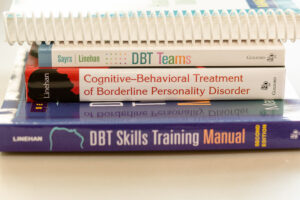In honor of the month of May being Borderline Personality Disorder (BPD) Awareness Month, we sat down with the Founder & CEO of Cincinnati Center for DBT, Dr. Nikki Winchester, to ask her some frequently asked questions about BPD.
 What should loved ones be looking for if they suspect their loved one may be living with borderline personality disorder (BPD)?
What should loved ones be looking for if they suspect their loved one may be living with borderline personality disorder (BPD)?
One thing would be self-harm and suicide attempts. The tricky thing about self-harm is that often people can be discrete about self-harm, so it may not be obvious to the family. Other potential signs are if there seem to be a lot of out-of-control, up-and-down that seem inexplicable, or fears of abandonment when the person doesn’t want to be alone without them. If the person is using very dysfunctional ways to cope with significant problems with emotion regulation, that’s a big sign to look out for.
 What are the first steps someone should take to get help for borderline personality disorder?
What are the first steps someone should take to get help for borderline personality disorder?
The number one thing is to start researching and find a clinician who is well-trained in dialectical behavior therapy (DBT). Seek out a DBT clinician in your area. It’s really important that the person is working with someone who is well-trained in how to work with BPD. There are a lot of clinicians out there who might take a brief training or workshop in DBT and then advertise as providing DBT but they don’t know how to do DBT adherently. To be able to provide DBT as it was designed by Dr. Marsha Linehan, clinicians must receive a lot of training and supervision and work with a team of DBT clinicians. Unfortunately, a lot of clients don’t know to look for that – they see that DBT is checked off on a clinician’s profile and they don’t know what to look for or what questions to ask. Depending on where the clients is at, they may not have the energy or desire to do that research, but it could be a life-or-death matter We know that the outcomes are better when clinicians provide DBT adherently. Is the clinician part of a team of other DBT clinicians that’s meeting weekly? Are they providing all four modes of DBT? The resource to look for is the DBT-Linehan Board of Certification. Clients can find DBT-LBC certified clinicians and programs on the website, which is important because DBT-LBC is the only DBT certifying body that’s endorsed by Dr. Marsha Linehan, who created the treatment. DBT-LBC certification is a rigorous process to go through and is the gold-standard in knowing that your clinician is doing what they say they’re doing.
 What advice do you have for someone seeking treatment for borderline personality disorder?
What advice do you have for someone seeking treatment for borderline personality disorder?
What are some myths that people believe to be true about borderline personality disorder that are actually false?
Another myth is that people with BPD are all the same and manipulative or over-the-top. Remember, there are nine criteria and a person has to meet five criteria to receive the diagnosis, so that means there are a ton of different combinations of symptoms and it can look very different from person to person. As far as the manipulation piece, this is a large part of the stigma associated with the disorder. When it comes down to it, all humans are manipulative. We all do things to influence other people to get what we want and that can be truly effective. If someone with BPD is manipulative, they’re not very good at it because they tend to be really obvious. Usually, they don’t really know how to get what they want effectively.
To learn more about Borderline Personality Disorder (BPD), click here: Borderline Personality Disorder Treatment
To learn more about Dialectical Behavior Therapy (DBT), click here: What is Comprehensive DBT?


